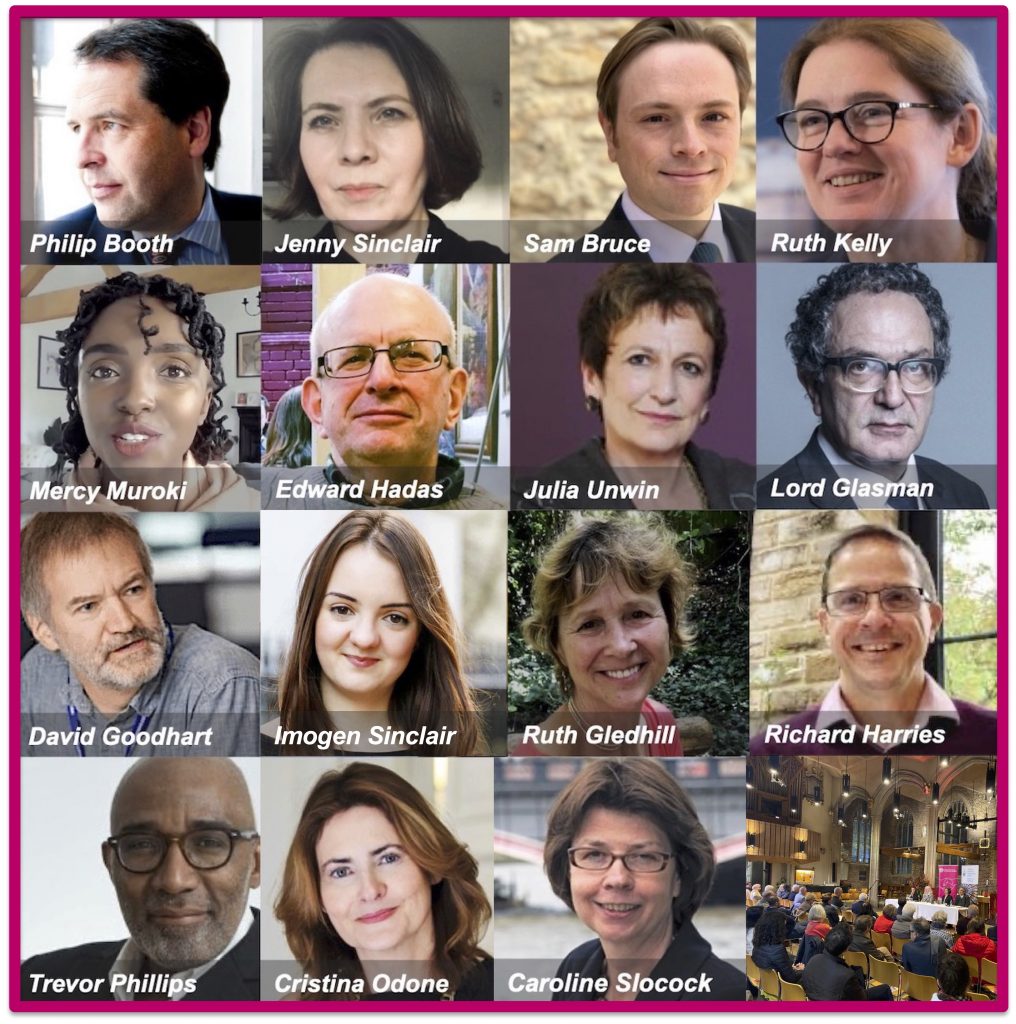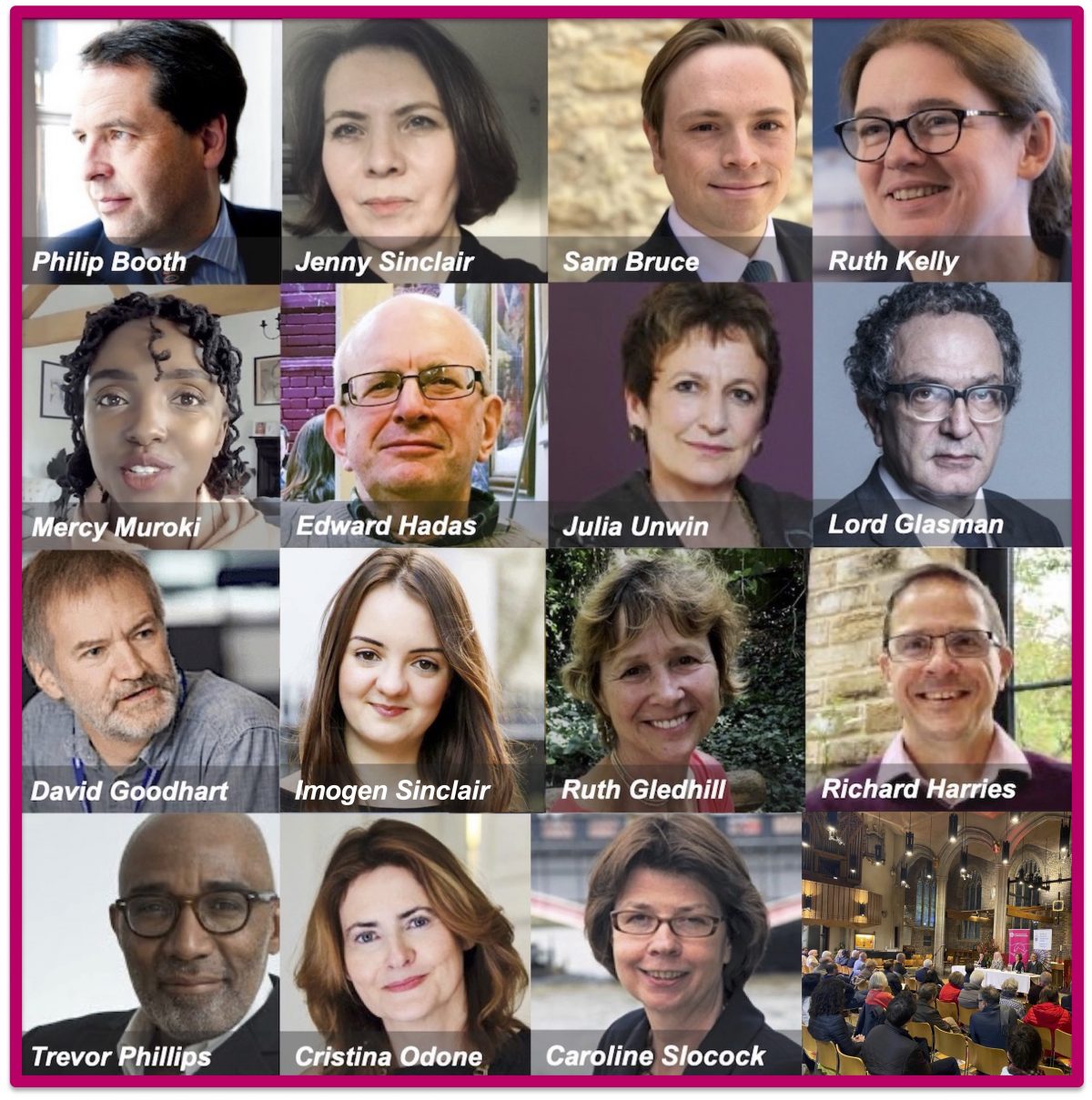
The Common Good: what does it mean for families, for society and for government?
A series of four public conversations
Politicians regularly say that they want to act for the common good. This is not surprising. After all, who could disagree? But, what does the term mean? And is it an agenda just for politicians? In this series of four events hosted jointly by Together for the Common Good, the Centre for Social Justice, Caritas Social Action Network, the Benedict XVI Centre for Religion and Society at St. Mary’s University, we explore the meaning of the common good, and the responsibility it places on families, society and the state. The series was supported by our longstanding partner, CCLA, one of the UK’s largest ethical fund managers, home of the new Catholic Investment Fund. The first three events were held online, and the fourth was held in person, at the Church of St Mary Putney, home of the historic 1647 Putney Debates.
EVENT 1: The common good – what does it mean? This took place on 15 June 2021. Video available below.

- Philip Booth, Director of the Vinson Centre and Professor of Economics at University of Buckingham, Director of Catholic Mission and Professor of Finance, Public Policy and Ethics at St. Mary’s University, Twickenham [download his opening remarks]
- Jenny Sinclair, Founder Director, Together for the Common Good [download her opening remarks]
- Dr Sam Bruce, Project Lead Researcher for the Communities Project at the Centre for Social Justice
- Chair: Ruth Kelly, Non Executive Board Member at Council for the Economy, Vatican and Visiting Professor at St Mary’s University, Twickenham
The idea of the common good has been used within Catholic social teaching for many years. But, together with the related idea of “social justice”, it is often misunderstood as utopian or coercive. It is also misunderstood in utilitarian terms as an alternative to the “general welfare”. The common good in its true sense relates more to a settled pluralism of identities and interests, the shared life of a society to which everyone freely contributes and is able to flourish and reach fulfilment. At a time of great uncertainty, this event explored the meaning of this powerful concept and why it is important in our social and political discourse now. Against the backdrop of the complex challenges facing the country, the panel examined how the common good can be understood by people of all religions and none in the reweaving of a good and healthy society.
EVENT 2: The common good: what does it mean for the family? This took place on 13 July 2021. Video available below.

- Edward Hadas, Research Fellow at Blackfriars, Oxford working on Moral Economics and Finance and Catholic Social Teaching, and freelance journalist writing on financial and economic topics for Reuters Breakingviews [download his opening remarks]
- Cristina Odone, Head of Family Policy at the Centre for Social Justice, founder of Parenting Circle charity and author “Concentrated Parenting” [download her opening remarks]
- Mercy Muroki, writer, commentator and journalist. Until recently she was a Senior Researcher at the Centre for Social Justice and a Commissioner on the Commission on Race and Ethnic Disparities.
- Chair: Ruth Gledhill, online editor at The Tablet, and former religion affairs correspondent for The Times
The focus of much of social and economic policy and rights-based rhetoric is the individual. However, we all grow up in and belong in families. That is so, even if families come in all shapes and sizes and are sometimes fragile and face immense challenges. But there is evidence that the focus on the individual can create conditions that weaken family life. It is the family in which we are formed, it is where we learn to share resources, reconcile collective goals with our unique individuality, grow up and then assist the older generation, returning the love and service we received as children. The family is the fundamental unit of socialisation and the foundation upon which the common good is built. Drawing on the first event and acting as a precursor to the two subsequent events in the series, our panel considered what needs to happen in civil society and public policy to create the conditions in which the family can fulfil its critical role.
EVENT 3: The common good: what does it mean for society? This took place on 29 Sept 2021. Video available below.

- David Goodhart, author, journalist, Head of the Demography unit at the Policy Exchange, and Commissioner at the Equality and Human Rights Commission
- Trevor Phillips OBE, writer, broadcaster, chairman of the Green Park Group, co-founder of the data analytics firm Webber Phillips and chairman of Index on Censorship
- Dame Julia Unwin DBE FAcSS, author and former chief executive of the Joseph Rowntree Foundation and the Joseph Rowntree Housing Trust
- Chair: Richard Harries, Associate Director, Institute for Community Studies, member of the Advisory Councils of Volunteering Matters, NCVO and Our Common Good, Senior Associate of the Power to Change Trust and a Visiting Senior Fellow at St Mary’s University, Twickenham
- NB. Tim Montgomerie was unwell
It is sometimes thought that responsibility for the common good falls only upon the state. In fact, the common good also depends on each individual, family and civil society institutions working in harmony, each taking responsibility at the appropriate level. At their best, associations, businesses, clubs, churches and other faith groups, charities and other local institutions all play a vital part in promoting the common good, enabling people to find fulfilment together. But modern liberal democracies are full of insoluble conflicts of interests between individuals and groups: the common good means we have to negotiate between sincerely held beliefs. This event looked at the capacity of our institutions, in the context of the Levelling Up agenda, to fulfil their responsibilities as we work together towards civic renewal. The hashtag was #commongoodinsociety
EVENT 4: The common good: what does it mean for government? This took place on 16 November 2021 at the Church of St Mary Putney, London. Video available below.

The appropriate role for government is contested – some argue for a strong, centralised state that guides the economy and explicitly supports civil society and the family. Meanwhile, others make the case for a decentralised model, rooted in the renewal of place, and in the revitalising of local and regional institutions. Others believe that only a more hands-off approach will allow civil society and the family the room, freedom and resources to flourish.
Quotes from the debate can be found on Twitter via this link #commongoodgovernment
Held in-person at the church of St Mary’s Putney, home of the historic 1647 Putney Debates, our discussion was led by:
- Lord Maurice Glasman, Labour Life Peer, political theorist and thinker on political economy, organiser and writer, Director of the Common Good Foundation and founder of Blue Labour
- Imogen Sinclair is the Director of the Social Covenant Unit, established in 2021 by Miriam Cates MP and Danny Kruger MP. Imogen has several years’ experience working in Parliament and is the author of ‘Community Capital’ (2019) for the Centre for Social Justice. She holds a Masters with distinction in Philosophy completed under the supervision of the late Professor Roger Scruton.
- Caroline Slocock, founding member of A Better Way and co-convenor, the founder and Director of Civil Exchange, member of the Early Action Task Force and a former senior civil servant
- Chair: Ruth Kelly, Non Executive Board Member at Council for the Economy, Vatican; Visiting Professor at St Mary’s University, Twickenham, former MP and senior government minister
- NB. Danny Kruger was required for a vote in the House of Commons and was unable to attend.


